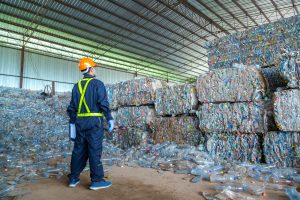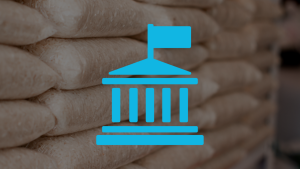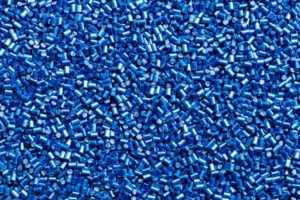Plastic by the Numbers
Have you noticed the number imprinted inside the recycling symbol on most plastic materials? Many people assume that symbol means it is recyclable, when in fact these numbers simply indicate what type of plastic the material is made from.
The recycling symbol found on plastic products does not indicate that a product is necessarily recyclable nor recycled. The number is a resin identification code that tells you what kind of plastic that material is made of. Plastics that have #1 (PETE) or #2 (HDPE) are the most commonly recycled plastics. Plastics #3 , #4, #5, #6 and #7 are generally tougher to recycle and are not universally collected in local recycling programs. Some packaging is unavoidable, but we can choose plastic packaging made from material that can be recycled.
Recycling
Although plastic can be recycled these numbers do not automatically mean they are accepted in your local recycling program. Accepted materials in recycling programs vary from city to city. Always check with your local municipality to confirm that a plastic material can be recycled in your community.
Released for Circular Economy Month 2023’s #PlasticsThursday, check out this infographic!
#1 Polyethylene Terephthalate (PET/PETE)
A clear hard plastic often used as single-use food and drink containers such as water & pop bottles, vegetable oil containers, peanut butter containers, cleaning product bottles, and some prepared frozen food containers.
Recyclability
Recycled polyethylene terephthalate is known as RPET and the most widely recycled plastic in the world.
Recycled Product Uses
- Fiber for carpet
- Fleece jackets, comforter fill, tote bags
- Containers for food, beverages (bottles), and non-food items
- Film and sheeting
- Strapping

#2 High Density Polyethylene (HDPE)
A hard plastic not as transparent PET that is often used for household cleaners, buckets, shampoo bottles, and yogurt containers.
Recyclability
HDPE is accepted worldwide because it is one of the easiest plastic polymers to recycle. Most recycling companies will collect HDPE material and take these to large facilities to be processed. If there are other plastics in the batch the recycled end-product may be ruined.
Recycled Product Uses
- Bottles for non-food items (shampoo, soaps, cleaners, etc.)
- Plastic lumber
- Recycling bins
- Floor tiles
- Buckets, bins and crates
- Flower pots and garden edging
- Film and sheeting

#3 Polyvinyl Chloride (PVC)
Frequently used for vinyl and pipes and not as stiff as PET and HDPE. It is the primary base plastic in a variety of piping, paneling, decking, fencing, bottles, credit cards, and IV fluid bags and tubing. PVC products have an average lifetime of 30 years, with some reaching 50 or more years.
Recyclability
There is high chlorine content in raw PVC (around 56% of its weight), as well as high levels of hazardous additives added to achieve desired material quality. As a result, PVC requires separation from other plastics for recycling.
Recycled Product Uses
- Piping
- Decking, fencing, gutters
- Garden hoses
- Carpet backing, floor tiles, resilient flooring & mats
- Mud flaps
- Electrical boxes and cables
- Traffic cones
- Mobile home skirting
- Packaging, film and sheets

#4 Low Density Polyethylene (LDPE)
A soft flexible plastic that is often used as: bread bags, frozen food bags, and plastic shopping bags.
Recyclability
To be recycled the plastic film must be separated, which includes HPDE film from LDPE film. In addition, clear films should be separated from coloured or printed film. Film that is not separated can affect its value.
Recycled Product Uses
- Shipping envelopes
- Garbage can liners
- Floor tiles and paneling
- Furniture
- Film and sheeting
- Compost bins and trash cans
- Landscape timber and outdoor lumber

#5 Polypropylene (PP)
A plastic commonly found in caps, some yogurt containers, medicine bottles, and straws.
Recyclability
One of the least recycled post-consumer plastics at a rate less than 1%. The recycling process involves 5 steps: collection, sorting, cleaning, reprocessing by melting, and producing new products from recycled PP. The melting process involves two steps: melting PP at nearly 250°C to get rid of contaminant molecules; removing residual molecules under vacuum and solidification at 140°C. The products made following this process can be blended with virgin PP at a rate up to 50%.
Recycled Product Uses
- Automobile applications: battery cases, signal lights, battery cables
- Brooms, brushes and ice scrapers, garden rakes
- Oil funnels
- Bicycle racks
- Storage bins
- Shipping pallets, sheeting, trays

#6 Polystyrene (PS)
Commonly found as single-use coffee cups, single-use utensils, and take-out food containers, and trademarked as Styrofoam.
Recyclability
Challenging and expensive because it is low density and on average 98 per cent air. It must be shipped to a facility where it can be compressed to become cost- and time-effective to transfer it over long distances to be recycled and reused.
Recycled Product Uses
- Thermal insulation
- Thermometers
- License plate frames
- Camera or video cassette casings
- Plastic mouldings (i.e., wood replacement products)
- Protective packaging
- Light switch plates
- Desk trays
- Egg shell cartons

#7 Other Plastics
This category of plastics represents everything that does not fit in the above resin codes, such as polycarbonates (PC). It also includes multi-resin and mixed plastic items. Examples include electronic equipment, glasses frames, and plastic brick toys.
Recyclability
Polycarbonates (PC), for example, are most difficult to recycle. One method of recycling polycarbonate is by chemical recycling. However, recycled PC may show lesser resilience and has reduced impact resistance when compared to newly manufactured PC. Products that are made with mixed plastics are difficult to recycle conventionally.
Recycled Product Uses
- Bottles
- Plastic lumber applications

References
- American Chemistry Council. Plastic Packaging Resins. Website: https://plastics.americanchemistry.com/Plastic-Resin-Codes-PDF/
- The Balance: Small Business.Recycling Polyethylene Terephthalate (PET). Website: https://www.thebalancesmb.com/recycling-polyethylene-terephthalate-pet-2877869
- Enkay – https://enkay.ca/p/recycle-codes
Updated October 18, 2023



